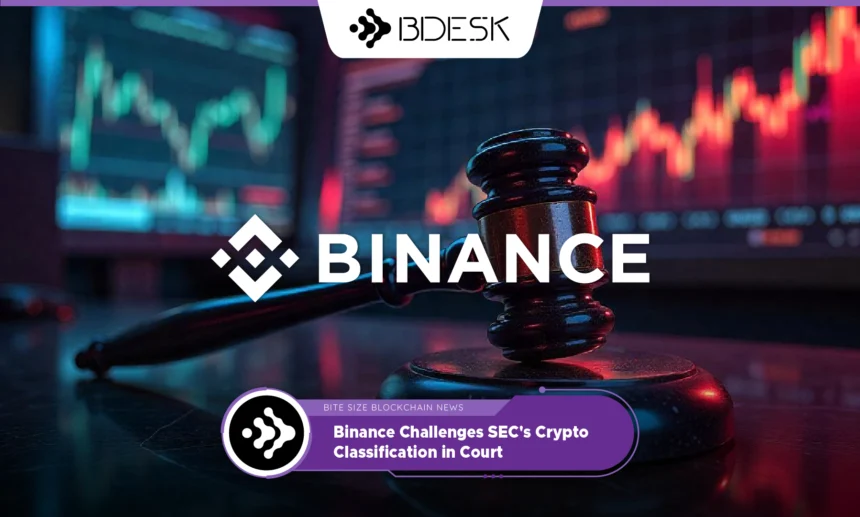Binance argues SEC misinterprets crypto regulations, impacting securities classification in its amended lawsuit.
SEC’s Crypto Classification in Question
Binance challenges the SEC’s expanded lawsuit, stating it disregards prior court rulings on crypto as securities.
Amended Complaint Sparks Dismissal Motion
Binance and founder Changpeng Zhao have filed a motion to dismiss the US SEC’s amended complaint. They argue the SEC’s stance on crypto classification ignores a recent court ruling that crypto isn’t automatically classified as a security.
Disputing SEC’s Broadened Lawsuit
In a Nov. 4 court motion, Binance’s legal team contended that the SEC’s new lawsuit contradicts a previous decision. This decision clarified that digital assets don’t inherently constitute securities transactions on secondary markets after initial distribution by developers.
Legal Basis Under Scrutiny
Binance asserts that the amended complaint lacks a distinct legal basis for differentiating investment contracts from the assets traded within these contracts.
“Assets—whether oranges, Beanie Babies, or crypto assets—do not become investment contracts in perpetuity simply because they were initially offered and sold to customers as part of a package of promises and expectations that collectively qualify as ‘investment contracts’ under the Howey test.”
Challenging the Nature of Token Sales
Binance argues that crypto sales on exchanges lack direct interaction between buyers and sellers, which eliminates the essential element of a joint enterprise required to classify transactions as investment contracts. Transactions, Binance says, occur via automated software, and buyers typically have no expectation of profit through Binance’s investments.
SEC’s Classification of Blind Sales
Binance and Zhao contested the SEC’s classification of alleged “blind sales” of BNB by Binance Holdings as investment contracts, arguing these sales resemble resales where buyers have limited information about sellers. Binance claims this setup doesn’t meet the criteria for investment contracts.
Financial Relief Requests Draw Opposition
Additionally, Binance’s motion seeks to prevent the SEC’s request for financial relief measures, including Zhao’s potential securities market ban. Binance contends that despite a 16-month investigation into Binance’s practices, the SEC hasn’t shown any customer harm, a requirement for seeking financial relief.
“After an extensive pre-suit investigation and 16 months of ‘expedited discover’ into BAM’s custody of customer wallets and assets… the Amended Complaint still conspicuously lacks any allegations that the challenged conduct by BHL or Mr. Zhao harmed customers, as is required for the SEC to seek disgorgement.”
Expanding the Crypto Debate
This legal move follows the SEC’s decision earlier this year to broaden its lawsuit against Binance, encompassing additional digital assets and asserting that most crypto transactions are securities. The debate has highlighted the SEC’s inconsistencies in classifying digital assets and raised criticism for conflicting with court rulings.
Ongoing Debate over Regulatory Clarity
The court motion represents a pivotal point in the broader discussion around how the SEC regulates digital assets. Binance’s challenge underscores the industry’s call for regulatory clarity as the SEC faces scrutiny for its varied stance on crypto securities.
Disclaimer:
The information provided on 13Desk is for informational purposes only and should not be considered financial advice. We strongly recommend conducting your own research and consulting with a qualified financial advisor before making any investment decisions. Investing in cryptocurrencies carries risks, and you should only invest what you can afford to lose. 13Desk is not responsible for any financial losses incurred from your investment activities.











